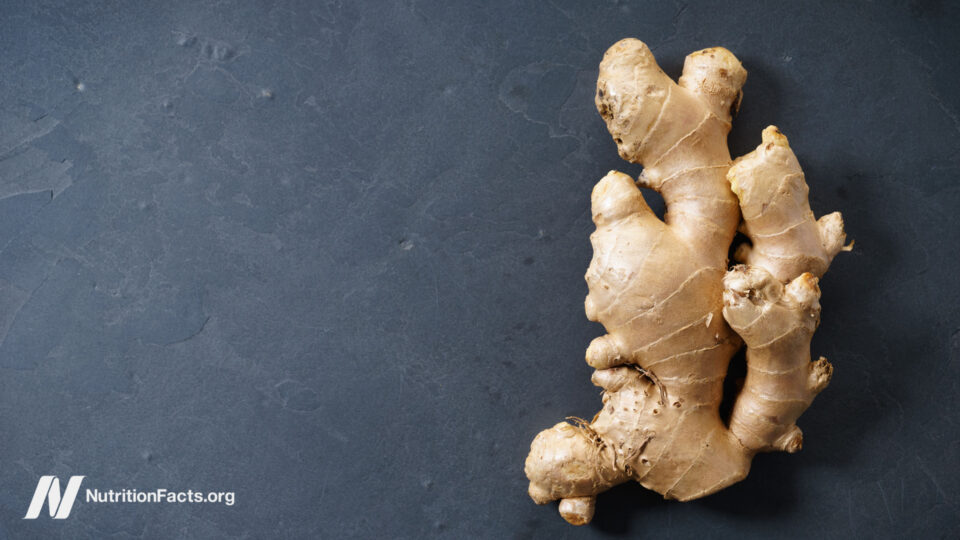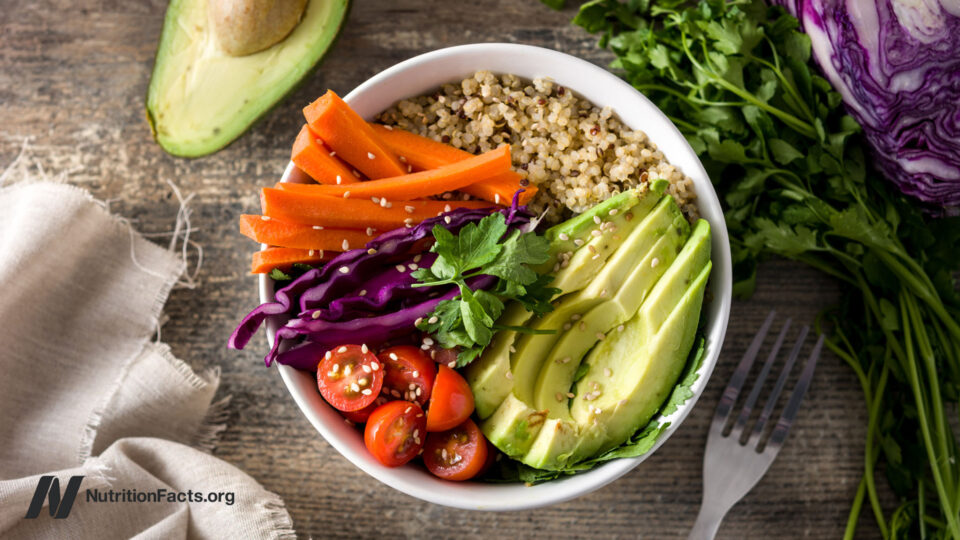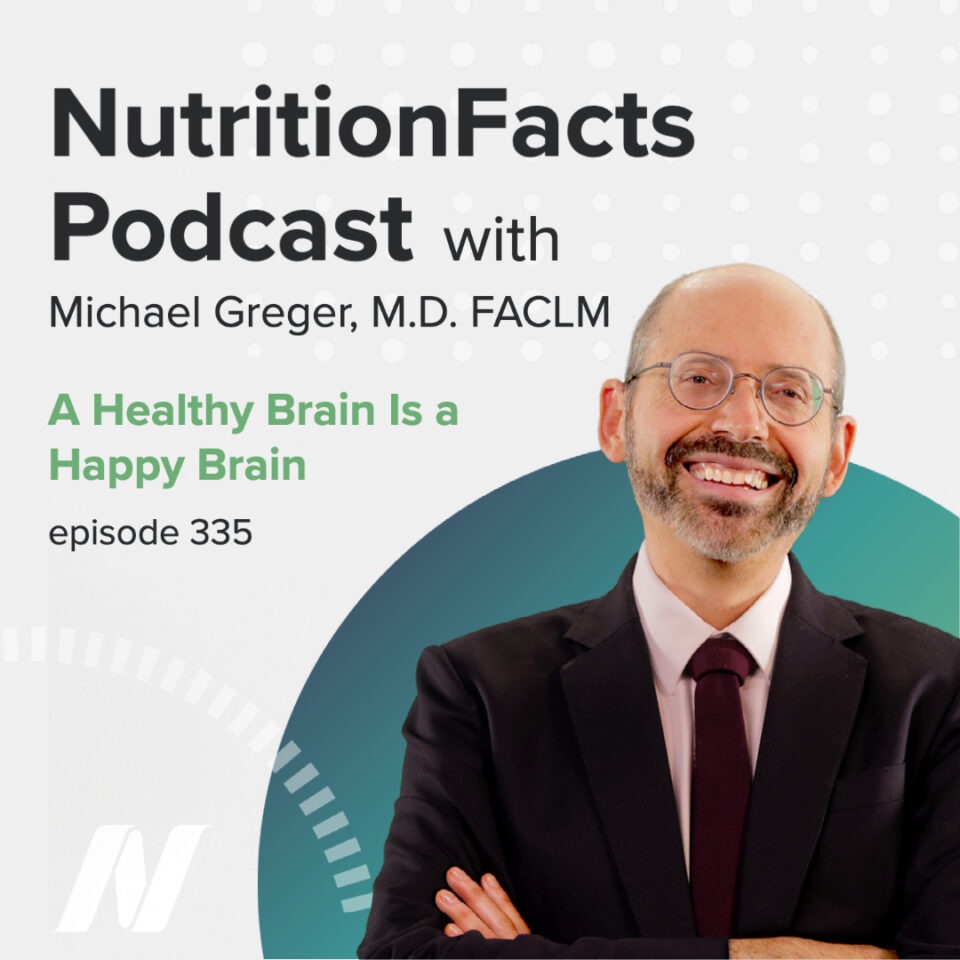Dr. Greger’s Top Takeaways on Mosquito Repellents, Oral Health, and Cognition

Every month, we publish around eight new videos, four Friday Favorites, eight blogs, and four podcasts on NutritionFacts.org. We are bursting at the seams with all sorts of health and nutrition information, so we wrapped up the juiciest bits into a nice, bite-sized blog as an end-of-month recap in case you missed anything or just want a refresher. What were some highlights from May?
Is DEET the Best Mosquito Repellent? and Natural Alternatives to DEET Mosquito Repellent
 The mosquito is the world’s most dangerous animal. Hundreds of thousands of people die annually from mosquito-borne malaria, billions are at risk of contracting dengue fever, and Zika poses a whole new global public health threat.
The mosquito is the world’s most dangerous animal. Hundreds of thousands of people die annually from mosquito-borne malaria, billions are at risk of contracting dengue fever, and Zika poses a whole new global public health threat.
DEET, when rubbed onto the skin, is considered to be the most effective mosquito repellant and has been found to be safe for pregnant women and children older than two months.
Electronic repellents have no effect on preventing mosquito bites, but researchers found that 5 (out of 20) essential oils had a lasting effect. Interestingly, citronella was not one of them. Cinnamon oil reduced mosquito attractiveness for 90 minutes, peppermint and lemongrass oil for 30, and spearmint and garlic oil for a shorter duration.
Lemon eucalyptus is the only plant-based repellent recommended by the CDC, though it shouldn’t be used by pregnant women or children under three. When tested, 40 percent lemon eucalyptus prevented bites from aggressive mosquito species for four to seven hours and for longer than 12 hours for less aggressive species, a period of prevention greater than a 10 percent or more DEET repellent.
The Negative Effects and Benefits of Plant-Based Diets
 We’ve long known that vegetarian diets and lifestyles may reduce the risk of many chronic diseases, and we now also know they may reduce healthcare costs. Vegetarians were found to have significantly lower inpatient, outpatient, and total medical care expenditures for chronic lifestyle conditions such as high blood pressure and high cholesterol, depression, stroke, cancer, and heart disease. It isn’t all or nothing, though. Simply increasing consumption of plant-based foods while reducing intake of animal-based products may confer a survival advantage. Just be sure to get a regular, reliable source of vitamin B12.
We’ve long known that vegetarian diets and lifestyles may reduce the risk of many chronic diseases, and we now also know they may reduce healthcare costs. Vegetarians were found to have significantly lower inpatient, outpatient, and total medical care expenditures for chronic lifestyle conditions such as high blood pressure and high cholesterol, depression, stroke, cancer, and heart disease. It isn’t all or nothing, though. Simply increasing consumption of plant-based foods while reducing intake of animal-based products may confer a survival advantage. Just be sure to get a regular, reliable source of vitamin B12.
Friday Favorites: The Best Knee Replacement Alternative for Osteoarthritis Treatment
 Obesity may be the main modifiable risk factor of osteoarthritis, the most common joint disease. It develops when our joints’ cushioning cartilage lining breaks down faster than our body can build it back up, and our knees are most often affected.
Obesity may be the main modifiable risk factor of osteoarthritis, the most common joint disease. It develops when our joints’ cushioning cartilage lining breaks down faster than our body can build it back up, and our knees are most often affected.
Approximately one in two hundred knee replacement patients may die within 90 days of surgery and one in five describe being unsatisfied with the outcome. Thankfully, losing 20 pounds of fat “might be regarded as an alternative to knee replacement” for obese individuals with osteoarthritis.
Osteoarthritis sufferers not only have higher cholesterol levels in their blood, but within their joints, so it makes sense that a cholesterol-lowering diet may help prevent and treat osteoarthritis. In fact, a healthy enough plant-based diet may drop cholesterol as much as a starting dose of a statin drug and offers only good side effects, including lowering blood pressure and facilitating weight loss.
Diabetes: Can Ginger Help a Diabetic Diet? and Can Blueberries Help with Diabetes and Repairing DNA?
 In a petri dish, increasing exposure to ginger compounds improved blood sugar uptake of muscle cells almost as much as metformin, a popular diabetes drug. And, at 3.0 grams per day for eight weeks, study participants in the ginger group experienced a significant decrease in fasting blood sugars and long-term blood sugar control, “thereby showing the effect of ginger in controlling diabetes,” and similar positive results on blood sugar levels and long-term blood sugar control have been seen with the intake of ginger over time.
In a petri dish, increasing exposure to ginger compounds improved blood sugar uptake of muscle cells almost as much as metformin, a popular diabetes drug. And, at 3.0 grams per day for eight weeks, study participants in the ginger group experienced a significant decrease in fasting blood sugars and long-term blood sugar control, “thereby showing the effect of ginger in controlling diabetes,” and similar positive results on blood sugar levels and long-term blood sugar control have been seen with the intake of ginger over time.
And blueberries? A pair of Harvard studies found that intake of blueberries and other anthocyanin-rich foods was associated with lower risk of developing type 2 diabetes. Individuals eating 35 milligrams of anthocyanins a day (equivalent to a few spoonsful of blueberries, a quarter-cup of blackberries, a half-cup of raspberries, or a cup of strawberries or cherries) had less inflammation and significantly lower insulin resistance—as much as you’d get walking every day for about an hour. With a more typical half-cup serving of berries, participants demonstrated a significant reduction in the creation of free radicals, which can damage our DNA. Even a single portion of blueberries can improve protection against DNA damage, but the effect is transient, so we should eat berries at every meal.
Oral Health: Treating Periodontitis with Diet and What Are the Best Foods for Gingivitis and Halitosis?
 Periodontal disease, a bacterial infection resulting in destruction of the bone and connective tissue supporting our teeth, is one of the leading causes of our teeth falling out. Diets rich in saturated fat increase oxidative stress and inflammation, and there appears to be a link between cholesterol levels and periodontitis: People with high cholesterol have up to double the risk. Comparing vegetarians and non-vegetarians, those eating plant-based had “better periodontal conditions (less inflammation signs, less periodontal damage, and a better dental home care).”
Periodontal disease, a bacterial infection resulting in destruction of the bone and connective tissue supporting our teeth, is one of the leading causes of our teeth falling out. Diets rich in saturated fat increase oxidative stress and inflammation, and there appears to be a link between cholesterol levels and periodontitis: People with high cholesterol have up to double the risk. Comparing vegetarians and non-vegetarians, those eating plant-based had “better periodontal conditions (less inflammation signs, less periodontal damage, and a better dental home care).”
What about halitosis (bad breath)? Researchers found that bad breath levels dropped after participants ate a low-fiber meal and a high-fiber meal, but they dropped significantly more after the higher-fiber meal (which required more chewing) and stayed down even eight hours later. Ingestion of dietary nitrate, such as from greens and beets, may help control chronic gingivitis.
Check out our recent videos on this topic: How to Naturally Treat Tongue Coating-Associated Halitosis and Foods That Cause and Help Halitosis.
A Healthy Brain Is a Happy Brain
 We know plant-based foods are important for physical health, but what about cognitive health? Research has found that, compared to vegetarians, those who consume meat (including poultry and fish) have up to two to three times the risk of developing dementia. And, regarding day-to-day function, greater adherence to a more plant-based eating pattern has been related to better performance on all cognitive tasks measured.
We know plant-based foods are important for physical health, but what about cognitive health? Research has found that, compared to vegetarians, those who consume meat (including poultry and fish) have up to two to three times the risk of developing dementia. And, regarding day-to-day function, greater adherence to a more plant-based eating pattern has been related to better performance on all cognitive tasks measured.
There are multiple links between plant-based eating and better brain function. Plant-based diets can reduce BMI, and lower BMI has been associated with better cognitive function. Increased intake of saturated fat, which is found mostly in meat, dairy, and junk food, has been associated with a 40 percent increased risk of cognitive impairment and nearly 90 percent higher risk of Alzheimer’s.
Glycotoxins, aka advanced glycation end products (AGEs), have been implicated in diabetes, aging, and brain injury due to Alzheimer’s and stroke, and evidence suggests they contribute to cognitive decline in general. AGEs aren’t only associated with getting Alzheimer’s in the first place, but also its progression. Meat is the main high-AGE food, and data suggest reducing food-derived AGEs may be an effective treatment strategy for our epidemics of Alzheimer’s and metabolic disease.
This has been a wrap-up of just a small sampling of our recent content. To see everything from the past month (including Celebrating Traditional Chinese Cuisine with Hannah Che, our special bonus blog), be sure to check out the video, blog, and podcast pages.



